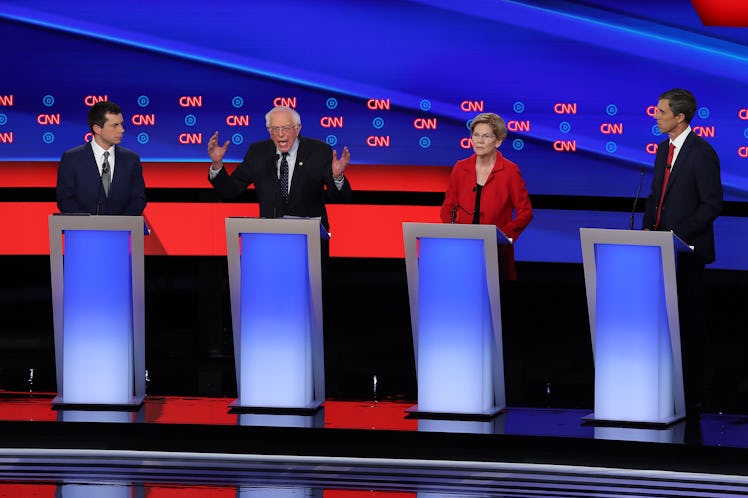
The Next Democratic Debate Is Going To Be Much Smaller
The days of having to slot out not one, but two full nights, to tune into the Democratic debates are behind us. No more new faces on TV that have us wondering if someone else launched another presidential campaign overnight. With about two weeks until the next round, the race is finally down to 10 candidates who will try debating their way to the White House. Who's out of the race, and who qualified for the Sept. 12 Democratic debate? The herd is thinning.
That’s still a lot of candidates, but this time around they'll all fit on one stage, on one night. The Democratic National Convention’s (DNC) deadline to qualify for next month’s debates was 11:59 p.m. on Wednesday, Aug. 28. Candidates needed at least 130,000 individual donors and 2% support in at least four qualifying polls.
Those who made the cut are: former Vice President Joe Biden, Sen. Elizabeth Warren of Massachusetts, Sen. Bernie Sanders of Vermont, Sen. Kamala Harris of California, Sen. Amy Klobuchar of Minnesota, Sen. Cory Booker of New Jersey, former U.S. Rep. Beto O’Rourke of Texas, Mayor Pete Buttigieg of South Bend, Indiana, former U.S. Secretary of Housing and Urban Development Julián Castro, and entrepreneur Andrew Yang. The debate will be broadcast on ABC News and Univision from 8 to 11 p.m. ET on Sept. 12.
Earlier on Aug. 28, Sen. Kirsten Gillibrand of New York dropped out of the race. After a campaign largely focused on women’s equality, she thanked her supporters with a final call for Democrats to defeat President Donald Trump in 2020. Other candidates who have voluntarily dropped out include Govs. John Hickenlooper of Colorado and Jay Inslee of Washington, who made climate change the forefront of his campaign.
Polling data is often unreliable and inconsistent, but when it comes to numbers, the top three candidates have remained pretty predictable. Biden consistently leads in the polls, with Warren and Sanders trailing behind. But, when money becomes a factor, Harris and Buttigieg become solid contenders. Sanders and Buttigieg each have over $30 million in individual contributions as of Aug. 23, per The New York Times. Warren, Harris, and Biden round out the top five in fundraising.
A narrower campaign field is not necessarily just good news. Some other candidates may have qualified if the DNC accepted polls from a wider range of organizations, per The New York Times, and critics have said the donor requirement prioritizes monetary fundraising before voter outreach. Others, such as Rep. Tulsi Gabbard of Hawaii, criticized the DNC for allegedly arbitrary qualifications requirements and a lack of transparency. As for viewers themselves, some voiced the opinion that the remaining candidates should still be split into two smaller debates.
Regardless, many are looking forward for a chance to see Warren and Biden take their first debate stage together. As the previous line-ups were determined by random draw, the two have yet to go head-to-head. Per NPR, Biden doesn’t seem too worried: “I'm just gonna be me. And she'll be her. Let people make their judgments. I have great respect for her,” he said. The matchup may serve to highlight further differences between Biden's traditionally Democratic values and his more progressive counterparts. In the June debates, Biden and Harris made headlines when the senator drilled the former vice president about his record on race, and his controversial history of working with segregationists and opposing busing to racially integrate schools while serving in the Senate.
The Sept. 12 debate unfortunately won’t solve the frustrations that come with a 10-person debate stage, such as short speaking times and constant interruptions. Nonetheless, the Sept. 12 debate marks a new opportunity to see familiar faces in a new light. With more and more candidates dropping out, there's more time to focus on quality over quantity before the DNC makes its next round of cuts.